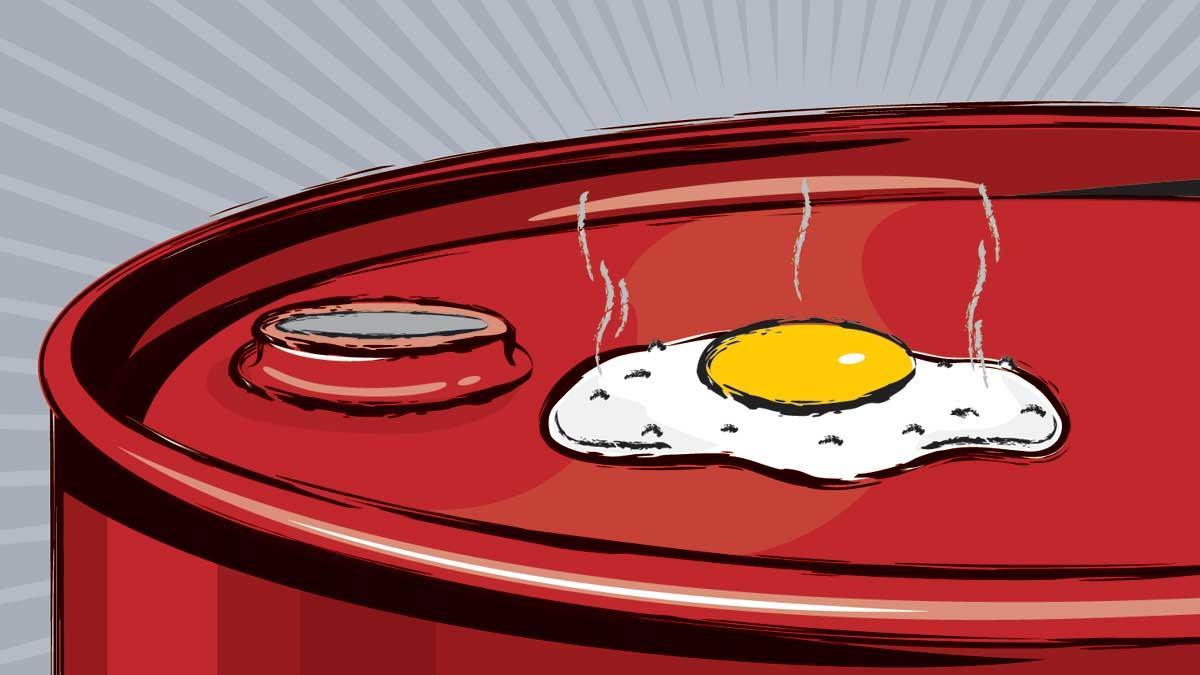
Temperature has many strange effects on lubricant states, performance and condition. Consider the following clever analogy about an egg:
Put an egg in the refrigerator and it remains unchanged.
Place it in very hot water and you get a hard-boiled egg.
Leave one out at room temperature and you get a rotten egg.
Put an egg under a mother hen and you get a live chick.
Like many things in life, when it comes to lubricant temperature, there's a need for control and moderation. In other words, you can expect problems if you have too little or too much. Find the temperature sweet spot and the performance and service life of your lubricant can be extended manyfold. Of course it's all so easy to say, but in practice can be oh so difficult to do.
How Cold Stresses Lubricants
On a cold winter morning, I like to wear my cardigan, which I always keep in a drawer next to my desk. It's just the added warmth I need to stave off the polar conditions that seem to penetrate my office walls.
Cold temperature can stress our lubricants as well. Unlike food, or our egg, which seems to benefit from cold temperatures, lubricants can chemically degrade, separate into phases, and exhibit altered physical states. A few examples of the consequences of cold lubricants includes:
-
Blended base oils can begin to separate into phases.
-
Paraffinic basestocks can become waxy and form gels.
-
Certain additives can become insoluble, resulting in settling, flocculation, and formation of deposits (such as bathtub rings in tanks).
-
Dissolved water can transition to emulsified water (more harmful) and the settling of free water becomes impeded.
-
Many additives that depend on heat-induced chemical reactions fail to perform (certain EP and AW additives, for instance).
-
Oil can become too viscous to circulate and grease too stiff to feed.
-
Contaminants by-pass filters as thickened cold oil opens relief valves.
-
Engines won't crank and moving parts in other machines may become locked up.
-
Oil rings, slingers, paddle gears, and other oil-lifting devices will often fail to work.
Neither Oil Nor Wine Like the Mercury to Rise
Hot oil has typically received the most press, even in this publication. After all, oil is not like fine wines that get better over time. In fact, even the very best wine will stress-out when exposed to too much heat. For instance, most wines will age roughly twice as fast at 77°F compared to 55°F, which is why connoisseurs and collectors prefer cellar temperature to store their liquid assets.
In 1903, Svante Arrhenius won a Nobel Prize when he figured out the relationship between temperature and most chemical reaction rates. Often called the Arrhenius Rate Rule, it relates to the fact that lubricants, once they've exceeded their base activation temperature, will degrade or oxidize twice as fast for every 10°C (18°F) increase in temperature.
In fact, there are a range of problems associated with too much heat. Let's start another list, this time concerning the consequences of high temperature on lubricants:
-
Accelerates additive and base oil decomposition (Arrhenius).
-
Some additives will volatilize and escape into the atmosphere.
-
Viscoity Index (VI) improvers shear down more rapidly.
-
Microbial contaminants prefer warmer temperatures (but not scalding).
-
Heat collapses oil films, causing accelerated abrasion and scuffing conditions.
-
Hot oil shortens the life of filters and seals and accelerates corrosion.
-
Both oil and grease are more prone to leakage.
-
Grease separates fasters (oil from thickener) at elevated temperatures.
-
High surface temperatures can form carbonaceous gum and resins.
Taking An Oil's Temperature
The table below illustrates the use of thermal lubrication charts (TLC). These can be easily designed with software found on most computers today. They can also be printed and laminated for posting on those machines exposed to dynamic temperature changes for easy review.
Of course, temperature plays a vital role in machine condition monitoring which is why heat guns are found in most PdM tool boxes these days. Just like we need to take our temperature to know if we are running a fever, most problems with lubrication, friction and wear will have a temperature profile or signature. So in that sense, temperature change is good.
When viewed together, the entire subject of temperature is no trivial matter, so keep that thermometer handy.

Developing Thermal Lubrication Charts for Critical Machines
-
It is recommended to develop thermal lubrication charts for critical equipment. Define temperature points A through F for a specific location on the machine to be monitored (for example, the supply line).
-
Normal working range (Zone 3) is banded by temperature points C and D. Temperature excursions below C are controlled by a heater and alarms. Temperature excursions above D are controlled by a cooler plus alarms.
-
Sustained operation in Zones 2 and/or 4 reduces the service life of the machine and/or lubricant. For instance, operating in Zone 2 may reduce lubricant flow to bearings, increase energy consumption, and increase foaming tendency. Operation in Zone 4 may accelerate oil oxidation, reduce film strength, and increase wear associated with particles.
-
Operating in Zones 1 and/or 5 threaten machine reliability. Temperature points A and F are sudden-death extremes. Zone 1 is typically a partial lubricant starvation condition while Zone 5 is associated with fire hazard, thermal-oxidative oil degradation, additive depletion, volatilization and high-friction/wear conditions.
-
The use of high VI lubricants helps lower temperature points A through C. The use of high VI and premium formulated synthetic lubricants helps increase temperature points D through F.





_small.jpeg)



